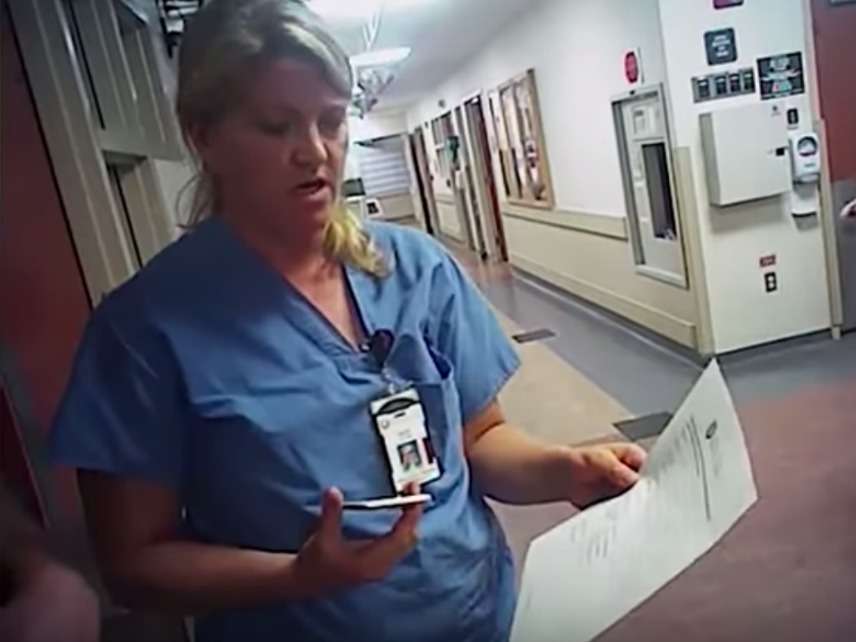Lawyer: Warrantless Blood Draw Stopped by Utah Nurse Was Legal in Another Reality
The facts and the law are on Alex Wubbels' side.

Alex Wubbels, the Salt Lake City nurse who was arrested on video after she refused to let a cop draw blood from an unconscious patient without consent or a warrant, has been widely praised for taking a stand against unconstitutional invasions of privacy. Her admirers do not include Gregg Re, a lawyer who argues in a recent Daily Caller piece, provocatively headlined "Arrested Utah Nurse Had It Coming," that "Wubbels was likely legally wrong under federal law." But Re cannot back up that contrarian claim without resorting to hypotheticals that do not bear any resemblance to this case.
Suppose "your neighbor bursts through your front door with a pile of drugs in his hands," Re says. The neighbor is trailed by cops who demand entry as he flushes the drugs down your toilet. If you refuse to let the cops in, Re says, they would be justified in entering anyway and might even arrest you if you tried to interfere. The point, he says, is that "police simply do not need a warrant if exigent circumstances justify an urgent search and seizure of evidence."
That scenario is a red herring, because Re never explains how Wubbels resembles the drug dealer's uncooperative neighbor. In particular, he fails to describe the exigent circumstances that supposedly justified Det. Jeff Payne's demand for her patient's blood, relying unstead on inapplicable generalities. "The imminent loss of blood evidence, which would be useful in a drunk-driving case, qualifies as a potentially exigent circumstance," Re writes. Potentially, yes. Necessarily, no.
In the 2013 case Missouri v. McNeely, the Supreme Court said "the natural dissipation of blood alcohol" does not automatically provide the exigent circumstances that would justify a nonconsensual, warrantless blood draw in a drunk driving case. "When officers in drunk-driving investigations can reasonably obtain a warrant before having a blood sample drawn without significantly undermining the efficacy of the search, the Fourth Amendment mandates that they do so," the Court said. "While the natural dissipation of alcohol in the blood may support a finding of exigency in a specific case…it does not do so categorically. Whether a warrantless blood test of a drunk-driving suspect is reasonable must be determined case by case based on the totality of the circumstances."
Re suggests the totality of the circumstances in the Utah case might have justified Payne's attempt to draw blood from William Gray, a truck driver who was critically injured in a crash with a vehicle driven by a man who was fleeing police. But as Scott Greenfield notes, "there was no attempt to obtain a warrant for the blood draw or reason why a warrant could not be obtained within a time frame sufficient to preserve the evidence." What's more, Gray was not a suspect in a drunk driving case; he was the victim of the other driver, who was killed in the crash.
That fact, Re concedes, "raises questions as to whether it was legally reasonable for the police to obtain his blood sample if he was, in fact, a victim not suspected of any crime." Payne reportedly wanted Gray's blood to help show that he bore no responsibility for the collision. That goal does not qualify as probable cause for a search and seizure, which requires a "fair probability" that evidence of a crime will be discovered.
In short, although probable cause and exigent circumstances can justify a nonconsensual, warrantless blood draw, there is no evidence that either existed in this case. Presumably that's why, although Payne handcuffed Wubbels while accusing her of interfering with his investigation, no charges were filed against the nurse. It is also why Payne, who is on administrative leave while his department conducts an investigation of his behavior, could face criminal charges instead.
Re aims to throw cold water on the "near-universal outrage" provoked by Wubbels' arrest and correct "reams of inaccurate reporting on the incident." Instead he muddies the issue by arguing that Payne's actions could have been legal if the facts were different.


Show Comments (151)